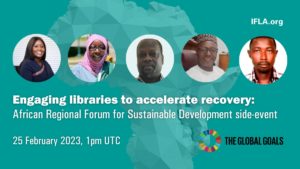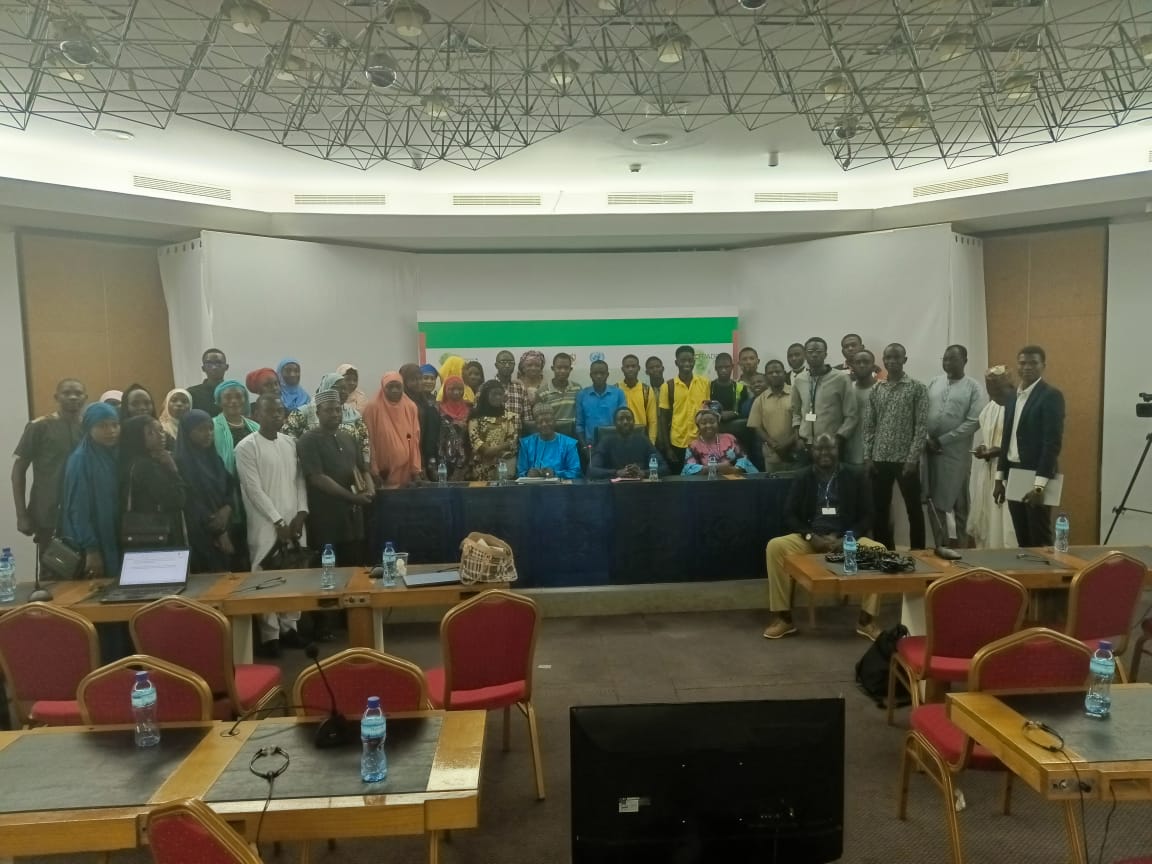At the heart of the response to crises: IFLA side-event at African Regional Forum on Sustainable Development
07 March 2023
Information is a key condition for development, in particular the face of crises. As an IFLA side-event at the African Regional Forum for Sustainable Development underlined, this makes libraries – if properly supported – into key players in providing a response to the challenges Africa faces today.
 The regional fora for sustainable development organised by the United Nations’ Regional Economic Commissions offer a great opportunity to reflect on challenges and solutions for sustainable development at the regional level.
The regional fora for sustainable development organised by the United Nations’ Regional Economic Commissions offer a great opportunity to reflect on challenges and solutions for sustainable development at the regional level.
The first of these in 2023 took place in Niamey, Niger, with a focus on Africa. IFLA was honoured to be accepted to host an in-person side-event on 25 February, focusing on the role of libraries in supporting the response to crises.
Moderated by Elizabeth Matheus, Librarian at the Namibian Civil Aviation Authority, panellists included Faridah Lalaikipian (Uzury Women’s Centre, Kenya), Professor Eugene Ndabaga (Associate Professor of Education at University of Rwanda College of Education), Nabil Seydou Harouna (Deputy Director of the Library of the Abdou Moumouni University, Niamey, Niger), and Amadou Tahirou, Communication and Scientific Culture lead, Institute for Development Research, Niamey, Niger). You can consult the biographies of the speakers here.
Thanks to their contributions, it was possible to set out clearly the role of libraries ahead of the main discussions at the Forum (28 February – 2 March), and so shape discussions there.
Crises faced, responses provided in Africa
While the COVID pandemic and recent economic challenges receive the most attention in general, the panellists looked to dig deeper and identifying some of the underlying issues the continent faces.
The topic of governance was particularly strongly highlighted, with there often being a gap between policy and implementation, as well as to assign blame rather than take responsibility. More broadly, panellists also highlighted the need to focus on a new, collective model of development that would see everyone – not just some individuals – benefit.
Africa had many advantages, including a population of strong and resilient people, but for them to realise their own potential they need a real, participatory democracy, as well as a change in mindset to overcome discrimination and barriers to change.
Libraries of course could play an essential role in addressing these concerns. Where they benefit from the relevant technological infrastructure, they could be holistic information centres, accessible and available for all.
As social spaces for information sharing, they could both help overcome exclusion and allow for the development of innovative and impactful new initiatives. They are also essential to support research and education in all areas, at all levels.
More directly, they could be on the front lines of efforts to fight against fake news, acting as bulwarks against misinformation and disinformation, thanks to their collections of selected and evaluated materials.

Empowered societies need empowered libraries
In addition to broader concerns, the panel looked in particular at the situation faced by libraries, including, too often, low levels of appreciation of the potential of libraries, limited financial resources, lack of data about libraries, and even of power.
These held back our profession and institutions from doing all that they could, leading to missed opportunities.
Here too, there were simple steps that could be taken. More could be done to raise awareness of resources available in libraries, as well as to train and support library staff. Library committees could provide a means of aligning library work with the needs of communities.
There was also a role for national initiatives, to increase investment, favour public-private partnerships, and to promote the library, information and documentation sector in general.
Local examples show the way
The session benefitted strongly from the engagement of the local library community in Niger, who shared examples that demonstrated what libraries can deliver.
A national science fair, organised with international and national partners (including different ministries), proved a great way of engaging with young people and promoting scientific skills. University libraries had a strong role in delivering on these events. There was great scope to make this an annual event, and include more libraries in planning and delivery.
Secondly, libraries were key players in setting up youth clubs, giving dynamic volunteers a possibility to carry out projects related to the SDGs, supported by teacher-researchers. These served not only to build skills, but also to broaden horizons.
IFLA is very grateful to all of the speakers at the session for their time and insights, as well as to the organising team – Sarah Kaddu, Damilare Oyedele, Victoria Okojie and Antonin Benoît Diouf – for their work to organise the session.
This activity was made possible through SIGL funding.